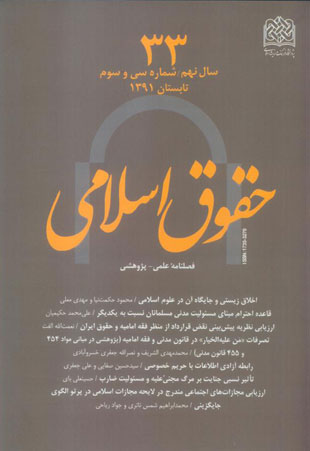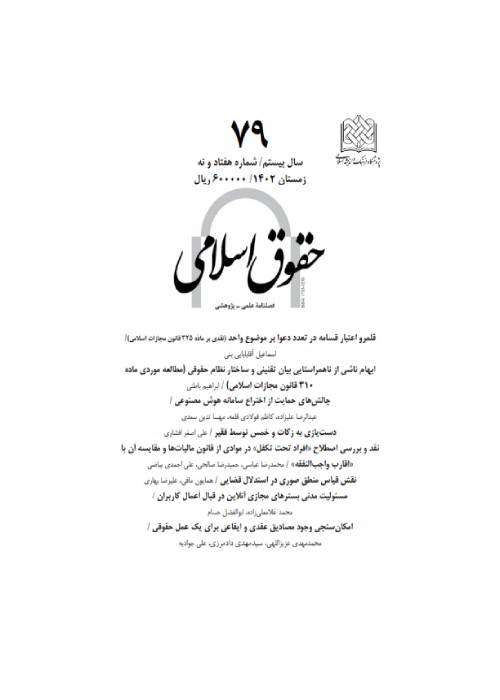فهرست مطالب

فصلنامه حقوق اسلامی
سال نهم شماره 2 (پیاپی 33، تابستان 1391)
- 226 صفحه، بهای روی جلد: 60,000ريال
- تاریخ انتشار: 1391/05/18
- تعداد عناوین: 7
-
-
صفحه 135
-
Page 7To legitimize legal rules in the field of biological sciences and biotechnology, legal systems usually discuss and investigate them within a pre-legal institution called “bioethics” which is based upon popular ethical and philosophical ideas. For this very reason, as “social morals” change, such legal rules change in these systems as well. On the other hand, because of its basis, the Islamic legal system infers validity and legitimacy of the required behavioral rules based on the wise Will of the Legislator using rules deduced from the four arguments (the Book, Sunnah, Reason, and Consensus). Thus, the place of the propositions of this discipline will be jurisprudence (fiqh) in the general sense of the term. As a result, it should be said that in the ideological structure of Islam, “bioethics” should be mentioned as “bio-jurisprudence”.Keywords: bioethics, ethics, Islamic legal system, bio, jurisprudence
-
Page 37Jurists have tried to introduce the juridical institution of automatic guarantee in various forms such as “wasting”, “causing”, “chances of gain or loss”, “the rule of possession”, “infringement”, “negligence”, and other instruments. They have not clarified, however, that whether these rules are bases to determine the responsible or to specify responsibility. In the present study, having distiguished the two bases, the author has intrdouced the rule or respect as the basis for responsibility of Muslims toward each other and the rule of no harm as the basis of responsibility for non-Muslims. The main and essential difference between two bases is that, in addition to be obliged to not harm each other’s properties, lives, and fames, Muslims are obliged to perform positive actions to fulfill the above obligations; while, toward non-Muslims, they are only negatively obliged and they should not harm their lives, properties, and fames.Keywords: rule of respect, rule of no harm, basis of responsibility, basis of responsible, the relation between rules of respect, no harm, foundations responsibility
-
Page 73The doctrine of prediction of breaching the contract is a way to compensate or reduce losses borne because of non-fulfillment of obligation and has been accepted in most contemporary legal systems. There are many points and issues in sayings of the great Shi’i jurists which show that this doctrine is not inconsistent with the Imami jurisprudence and, as a result, with the rules of Iranian Civil Code and Commerce Law. The existing traditional rules such as the doctrine of mandatory fulfillment of the exact obligation may most likely cause problems in the contemporary complicated relations. Thus, the rules of the doctrine of prediction of breach should find their places within the civil and commercial rules.Keywords: prediction of breaching the contract, suspension of the contract, cancellation of the contract, sanction for violation of the condition of performance
-
Page 107In the articles 454 and 455, the Civil Code has discussed various kinds of possession of the object of options and expressed the point based on two different assumptions. In the first part of the two articles, as a general rule, all conditions existing in the time of option have been considered as being correct, and the consequent cancellation of the contract has been said to be of no impact on them. Under the articles 454 and 455, the legislator has proceeded to discuss the statement under the assumption that there is no condition about transference or conversion [of the object of the contract]; and has said that such conditioned transference or conversion is rejected. Concerning the verbal complicacy of these articles on the one hand and serious difference in opinions of the jurists concerning this point, it is difficult to specify the basis chosen by the Civil Code. What that is inferred from the articles relevant to this point in the Civil Code as well as from the juridical background of this point is that concerning changes relevant to options, the Civil Code has followed the views of jurists who have made distinctions between legal optons and contractual options and are of the opinion that in the latter kind, in which it has been emphasized that the object of sale will not change, changes in other than options are not possible. Thus, the view of those legalists who are of the opinion that in the revocable sale, change in options is possible. And if the contract is cancelled, possession will become unenforceable is not consistent with the Civil Code.Keywords: the object of option, conditioned, option, cancellation, revocable sale
-
Page 135Freedom of information is one of the clear instances of freedom of speech mentioned in the international documents including Universal Declaration of Human Rights. On the other hand, to privacy and prohibition of violating one’s privacy, in the recent decades, much attention has been paid by the legalists. Generally speaking, all countries are going to enact independent codes to protect privacy. Freedom of information and privacy of people come, in some cases, to conflict each other. Iranian Law and rules have not specified limits of these rights and border between the two. Thus, the relation between them should be from a legal and juridical point of view studied. In the West, there are two views concerning the principle of freedom of information: the doctrine of absolute freedom and the doctrine of limited freedom (in the latter case, privacy is specially excluded from the scope of freedom of information). In the present writing, both views will be studied and criticized and, in conclusion, a third doctrine on the basis of special exclusion of privacy from the scope of freedom of information and its consequences will be introduced.Keywords: freedom of information, freedom of informing, freedom of speech, media, privacy
-
Page 161The crime committed against the victim, if an internal factor (such as disease) or an external penal factor (such as injury) or an external nonpenal factor (such as fall from height) is added to it, may sometime lead to the death of the victim. In such cases, since another factor has been involved in the death of victim, three probabilities are at stake of the responsibility of the criminal: “full responsibility”, “absence of responsibility” and “relative responsibility”. In this writing, it has been assumed that the standard for responsibility is that crime should be correctly ascribed; thus, in cases in which there is no justification to ascribe the crime to the criminal, his responsibility will be null and void; in a case in which death may be fully ascribed to [the crime committed by] the criminal. Responsibility will be fully that of hi, and if it [death] may be ascribed both to the crime and another factor, the criminal will be responsible as much as his act has been of influence in occurrence of the result; of course, it should be noted that under each and every condition, the criminal will be responsible, if the time interval between the original crime and occurrence of result is not more than one year.Keywords: ascription of crime, relative responsibility, participation in crime, permeation of crime
-
Page 191Study of the history of development of social punishments shows that such punishments have been employed in various models. One of these models is the model of substitution. The sketch of social punishments which have been presently included in the Chapter Nine of the Second Part of the first Book of the Bill of Islamic Punishments is based on the substitution model. Since the rules included in that chapter of the above Bill are not free from problems and defects of the substitution, thus there are certain doubts about success of social punishments included in that Bill. Thus, the legislator proposed to accept social punishments as “independent” reactions which fit the objective of “correction” and correct the rules mentioned in the above-mentioned Chapter Nine to extend the scope of application of social punishments.Keywords: imprisonment, substitute punishment, imprisoned population, cash fine, public services, period of being under surveillance


